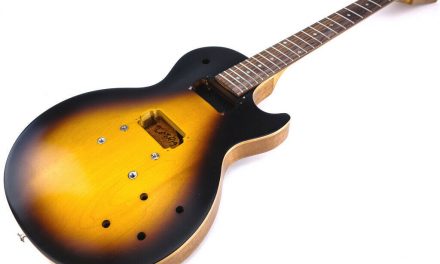Does the wood you use to make an electric guitar have any impact on what comes out of an amplifier when you play a guitar? Yes. How much of an impact? Once you stop listening to the name calling and vulgar language and really try to think about this scientifically, it’s pretty interesting.
Everyone would agree that different electric guitars sound different when strummed unamplified. A Strat sounds different than a Les Paul. Actually, I have two Strats, and they sound different than each other when strummed unamplified. What makes them sound different?
My Opinion
A guitar is a system of parts working together, and each part has an impact on the sound… though some parts have such a small impact it can’t be measured or heard. No one would argue that changing the knobs on a guitar has a big impact on the sound. Everyone would agree that changing the nut from cheap plastic to brass will change the sound, and everyone would agree that changing the pickup from a low output single coil to a high output humbucker will change the sound. But the wood? Can you hear the difference between maple and pine?
Paul Reed Smith says that while the wood matters, what matters more is the amount of water and the crystallization of the resin in the wood. To me, this makes sense and it also corresponds with my own experiences as a guitar player. He also says that the sound of a guitar acoustically does have an impact on the sound of the guitar through an amp. That also corresponds with my own experiences. The most obvious example is sustain – I’ve owned guitars that sounded like banjos. You pick a note and the thing’s dead in a second. Plug it in and you hear the same thing. But my Les Paul has a lot of sustain when played acoustically, and when I plug it in I hear the same sustain. I hear the same thing with brightness – an electric that sounds bright acoustically sounds bright plugged in, and the same is true with a dark sounding electric. Given the same set up pickups.
So put me in the “wood matters” camp, with a caveat: It matters, but not as much as some people think. I believe you could take a Mexican Strat and an American Strat and switch the bodies but keep everything else including hardware the same, you wouldn’t hear much if any difference. But make a Strat shape out of plywood and try the experiment and you’d hear the difference.
I think people who pay way over the top money for “rare tonewood” are kidding themselves. But I do believe that the wood in my Gibson Les Paul contributes to the fact that it sounds better than my Epiphone Les Paul. It certainly sustains longer and sounds better acoustically.
But what about the “evidence?”
My favorite example of evidence, which I will not link to, is a YouTube video of a guy standing at a white board, using “science” to “prove” that the wood in a guitar has no impact on the sound. Here’s the biggest problem with such an approach: It assumes that every variable is being accounted for. This from a guy who doesn’t capitalize in his comments and uses vulgar language. And having established his opinion, he will not accept the possibility that contrary evidence could be possible. That’s not science! He is proposing a theory. A theory is not a fact.
This whole debate reminds me of the Atkins Diet. Proponents claim we’ve been lied to all of these years, and a handful of people knew the REAL secret to how we should be eating. I had two relatives try it and both of them had to quit for health reasons. Like, in one case, pissing blood.
And the Chapman video? Where they built two guitars identical except for the wood, and there’s a slight difference in sound between the two of them, even when played by the same guy? I read the comments in vain looking for something that made sense to me, but 99% of the comments were insults, name calling, taunting, basically all the usual crap you find in great abundance in most website comments sections. Which is why I don’t have comments enabled here. All I saw was “I’m right because reasons.”
Conclusion
The Chapman video demonstrates that two guitars with different wood can sound different. And there are other videos on YouTube where two guitars from different woods sound the same. The conclusion I draw is that different woods can sound the same OR different. Why is that such a hard concept to grasp? Or the idea that maybe we don’t fully understand every variable that goes into a guitar’s amplified sound?





